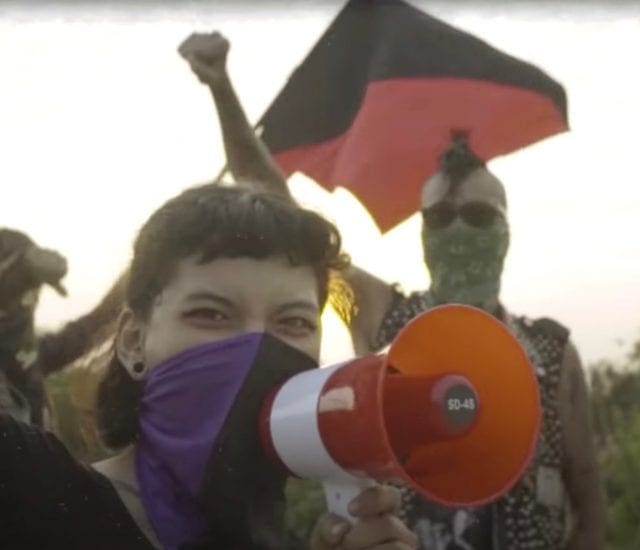Cet article en anglais est le résultat d’un projet collaboratif entre #AuxSons et Alejandro Abbud Torres Torija, professeur à Sciences Po Paris Campus Reims, et contributeur régulier d’#AuxSons. Dans le cadre du cours “Sons du monde : la musique comme miroir de l’intime et du collectif” des étudiants internationaux de Sciences Po Paris Campus Reims se sont penchés sur les liens entre musiques des quatre coins du monde et enjeux sociopolitiques.
This article is a result of a collaborative project between #AuxSons and Alejandro Abbud Torres Torija, lecturer at Sciences Po Paris Campus Reims, and regular contributor to #AuxSons. As part of the class “Sounds of the world: Music as mirror of the intimate and the collective”, international students from Sciences Po Paris Campus Reims prepared articles presenting contemporary music from different parts of the world in connection with recent socio-political events.
« Viva la revolution! Let’s sing together, let’s fight together! » shouted the leader of Rebel Riot, a Birmanian punk fighting against the junta. Since February’s coup, music has played a central role in the protests. Myanmar and protest songs have a long-shared history: the protesters quickly turned to songs that defined the 1988 pro-democracy uprisings. The three most well-known songs are Blood Oath, We Shall Not Surrender Till The End Of The World and Encourage Mi Nge. These three songs share common themes of fighting for the nation’s freedom and for history as well as facing hardships to achieve peace. They remind the entire country of its common past of fighting together against a military dictatorship. For example, We shall not surrender mentions key historical Burmese figures, such as Aung San, an independence activist considered as the father of modern Myanmar, and Thakin Kodaw Hmaing, a poet and political thinker remembered for initiating the peace movement in the country.
Blood Oath
We Shall Not Surrender Till The End Of The World
https://www.youtube.com/watch?v=Dsrm2DpoJwo
Encourage Mi Nge
https://www.youtube.com/watch?v=D8cZptGnjDc
However, as the 2021 protests have been led by the youth, new songs have also been created. This is the case of The Dictatorship Must End, One Day and Revolution. Like their ancestors, these three songs all mention being ready for the revolution, fighting for the people’s rights and lives, and ending the dictatorship. They illustrate Generation Z’s crucial role in these protests: all have become popular tools of resistance after being uploaded on social media. They are also part of a specific movement online: the Milk Tea Alliance, a movement of citizens from Hong Kong, Taiwan, Thailand and Myanmar, who are all fighting for democracy. As such, they have helped to gather international support for the pro-democracy movement. Like their older counterparts, these new songs also reference “heroes” of the nation, like “aunt” Aung San Suu Kyi, whom they want freed — she was placed on house arrest at the beginning of the coup.
The Dictatorship Must End (protest version)
Music has proven to be a powerful tool in the fight against dictatorship. Indeed, the songs have been used to call people into joining the movement, either by making links with Myanmar’s past or by appealing to shared values.
Rebel Riot - One Day
Moreover, in a society where women are expected to stay quiet, music has been a way for them to take the lead and go against the system — as the singer of the band Rebel Riot explained in an interview with Al-Jazeera. It can also help people cheer each other up in a time of hardships, and is very cathartic for musicians as well as the public, in a period of high uncertainty and fear.
Revolution
Music has therefore been a way to unite, but also to resist when it cannot be done otherwise. It is an easy and powerful way to occupy spaces when the military blocks streets and dissipates gatherings. Moreover, it gives everyone a voice: not only has it helped the movement gain international attention on social media, but while the military fights with weapons, people resist with what they have, voices, guitars, pots, and pans.
the author:
Carmine Audoly is a French student at Sciences Po and has lived in Paris and Los Angeles. Music is a central part of her life. She plays the accordion, the piano, and sings opera as well as jazz and rock music. As a political science student, she is particularly interested in the links between music and politics.
photo : Rebel Riot - One Day


